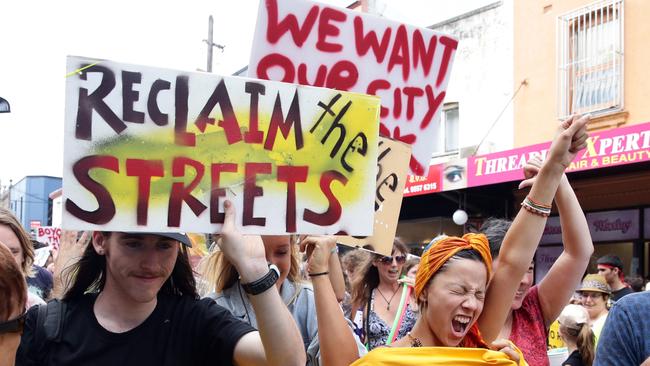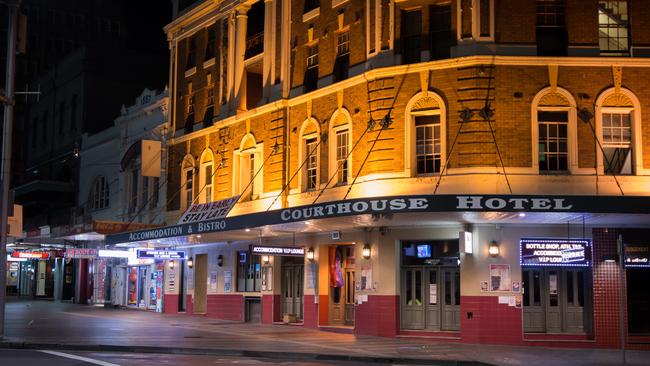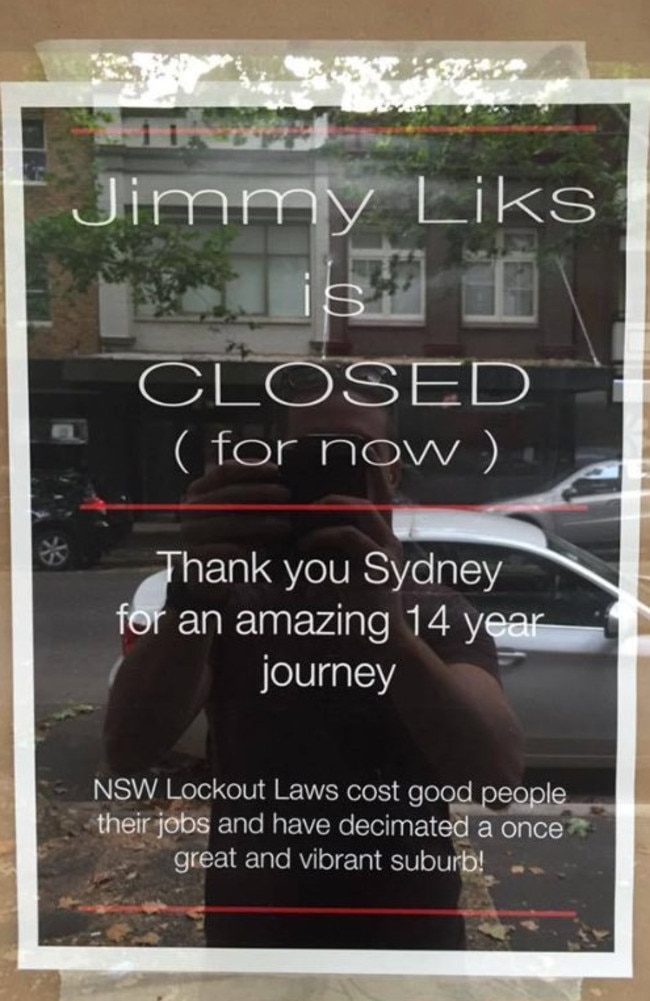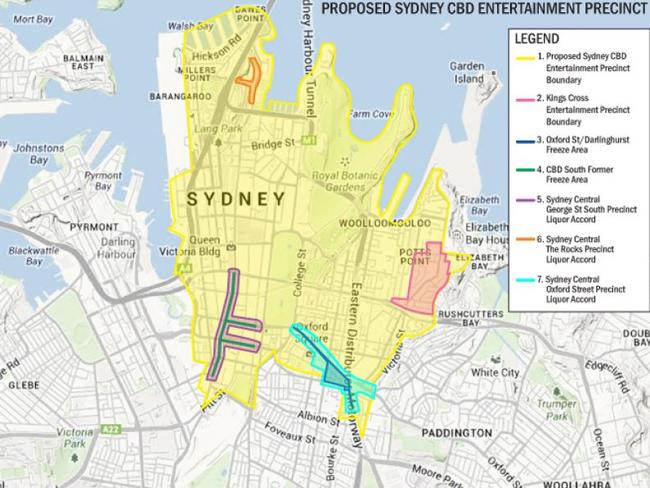Why you can’t go to the bottle shop after 10pm
AS A POWERFUL rant reignites debate over Sydney’s tough lockout laws, one law in particular is really infuriating punters.
DEBATE has reignited over Sydney’s controversial lockout laws but there is one law in particular that is really infuriating the punters.
The latest lockout law furore was sparked on Thursday with a blistering open letter on LinkedIn by entrepreneur Matt Barrie, who railed against the lockout laws for snuffing out Sydney’s once-vibrant night-life and turning the city into an “international joke”.
Mr Barrie, the chief executive of Freelancer.com, further accused NSW’s government of stifling the personal liberties of Sydneysiders in his biting piece, which quickly went viral.
“A special little person has decided that there is a certain time at night when we are all allowed to go out, and there is a certain time that we are allowed into an establishment and a certain time that we are all supposed to be tucked into bed,” Mr Barrie wrote.
“There is a certain time we are allowed to buy some drinks, and over the course of the night the amount of drinks we are allowed to buy will change.”
He continued: “It is now illegal to buy a bottle of wine after 10pm in NSW because not a single one of us is to be trusted with any level of personal responsibility.”
And it’s that last bit — the government’s restriction on takeaway liquor sales — that really seems to not stack up with many people.

The law was introduced as part of a suite of measures by the NSW Government to tackle alcohol-fuelled violence in Sydney.
While Sydneysiders have begrudgingly fallen in line with the strict lockout and last-drink rules, many still think forcing the state’s bottle shops closed at 10pm in a bid to stop one-punch deaths is a big step too far.
“The government is totally mistrusting people to make their own decisions. They’re taking away our responsibility by eliminating choice,” Marrickville resident Kirsty Carr told news.com.au.
“Shutting down the next bar, club, or bottle shop isn’t the solution to reduce alcohol-related violence. It’s about education and behaviour change, strategies that empower people to take responsibility and make better decisions, not sending businesses into bankruptcy and shifting the problems elsewhere.
“Quite frankly, it’s embarrassing — we’re being disempowered through our lack of choice. Plus, at the end of the day, these new laws don’t promote responsible drinking; if anything they encourage the binge drinking culture, to drink as much as you can before the bar or shop closes. “Give the Sydney population some credit, not every person that has a drink wants to king hit the next person they see.”
Mr Barrie told news.com.au the bottle shop restriction was “outrageous”.
“I think it’s outrageous that the government tells businesses when they can and cannot trade,” he said.
“Many hard working entrepreneurs and small business owners work well past 10pm and like shift workers and the police who work late, that have to enforce these silly laws, they are all discriminated against being able to have a bottle of wine with dinner.”

CONCERNS FROM THE INDUSTRY
The restriction on takeaway liquor sales is currently under review, however NSW Premier Mike Baird has already flagged he does not foresee any changes to the current rules.
Sam Nielsen, a venue manager based in Sydney’s Inner West, said that was disappointing because the liquor industry was feeling the hurt.
“I suppose I can’t talk for all bottle shops across Sydney but ours has definitely taken a bit of a beating. Especially this summer we’ve seen a significant decline in sales,” he told news.com.au.
“It’s definitely because we’re closing up earlier.
“We’ve had to remake the image of the bottle shop effectively, and turn it into a little bit more of a community place — we’re trying to turn it into a growler depot where we can switch growlers for people — to try and bring more people in.”
While he conceded closing bottle shops early was a logical next step in locking people from pubs and clubs — they’d just buy takeaway drinks instead — Mr Nielsen said he felt the statewide approach was “overkill”.
“I’ve never seen a lot of justification for it,” he said.
“I have seen and read the justification about the lockout laws, even though I have my own issues with how it’s pushed the problem into the Inner West and in Newtown, which is a classic example of where violence has dramatically increased, while it’s decreased in the city.
“It seems like an unnecessary thing, and it’s just lumped in with all these laws and this nanny state that Sydney’s turning into.
“I would like to have a little bit more ownership over what my business does. I’m relatively new to the management side of things and this doesn’t seem like a particularly pleasing career prospect anymore because there’s so much risk and restrictions in what you can do with the business.
“It seems like — and these are the words going around — that it’s unnecessarily killing the industry.”
The NSW Office for Liquor and Gaming has received submissions on the restriction on takeaway liquor sales as part of its review process.

The Liquor Stores Association NSW (LSA NSW) has urged the government to consider relaxing the current law, including provisions for regional liquor stores to apply to trade beyond 10pm “where there was a demonstrated need for more than 12 occasions per year”.
LSA NSW executive director Michael Waters told news.com.au that liquor stores, both in regional NSW as in inner Sydney, have experienced loss of sales from winding closing times back to 10pm, and had been forced to cut back on staffing. Some businesses, he said, were on the verge of failure.
He also said bottle shop staff have seen the confusion and frustration felt by customers.
“Aside from the decrease in service and convenience for consumers, many of our members have advised us that the statewide 10pm takeaway sales restriction has contributed to an increase in customer confusion, frustration, aggression and intimidation toward staff, and reported increases in theft — grab and run — and an increased risk and exposure to staff workplace health and safety issues,” he said.
“There have also been instances of situations whereby liquor store customers, initially seeking or intending to make a takeaway alcohol purchase to return home to consume, have no other alternative but to go to an on-premise environment.”
Mr Waters said the association questioned the one-size-fits-all, “blanket approach” of the law that it believed “did punish responsible licensees and patrons”.
He also said as the 10pm closing time was introduced as part of a range of anti-violence measures, it was difficult to determine how effective it has been.
“Further, given the rate of alcohol-related assault across NSW had been in consistent decline for a number of years prior to the introduction of the 10pm closure, (the association) again questions whether this “one size fits all” measure was necessary in the first place,” Mr Waters said.
“What LSA NSW and our members are concerned about, however, is that non-alcohol related domestic assault continues to increase, as well as the number of arrests for amphetamine-related offences, cocaine, narcotics and cannabis possession or use.

“We want to see government investing more resources on these issues, rather than add further regulation and restrictions on licensees, and inconvenience the majority of people who consume alcohol responsibly.”
‘IT’S A REASONABLE TRADE OFF’
But Australia’s top surgeons are pushing to keep the 10pm bottle shop closure, saying it had contributed to a nine per cent drop in assaults across the state, as well as fewer assaults in the CBD.
The Royal Australasian College of Surgeons’ trauma committee chairman Dr John Crozier told news.com.au a perceived lack of personal freedoms was a small price to pay for less violence in homes and on the street.
“The Bureau of Crime Statistics and Research evidence of a nine per cent reduction in non-domestic interpersonal assault requiring a police response is absolutely unparalleled and that’s against the background of a pleased and generalised downward trend in assault from 2008, where a progressive range of measures have resulted in that downward trend,” Dr Crozier said.
“This is the first whole-of-state measure where there’s been such a dramatic whole-of-state reduction in assault documented.
“Some compromise of personal freedoms for such a significant win in community gain ... is a reasonable trade off.
“The quest for profits can’t override the greater principle of safety to the community.”
Dr Crozier, who is also the co-chair of the National Alliance for Action on Alcohol, said the 10pm bottle shop closures had also contributed to a reduced call on police, paramedics and emergency room resources.
He said he has received testimonies from medical staff as far as Byron Bay, Lismore and Dubbo, who claimed the law had lead to improvements in those communities.
And restrictions on the sale of takeaway alcohol was not only about reducing crime in nightspots, but tackling domestic violence, Dr Crozier said.
“Unfortunately domestic violence is a common thread in the tapestry of Australian life,” he said.
“It’s a significant problem and this is a reasonable measure. It’s not a draconian measure, it’s not an unreasonable measure.”




